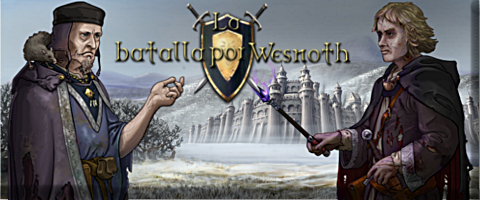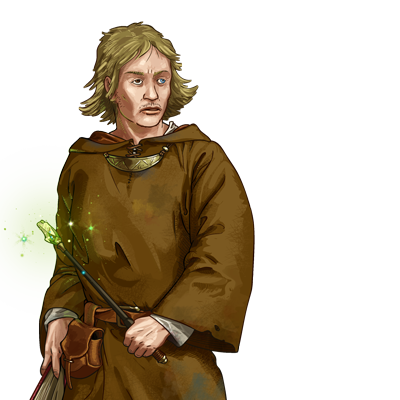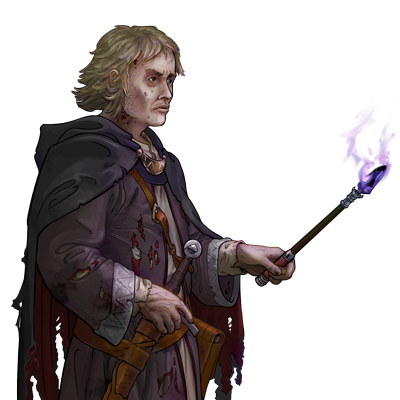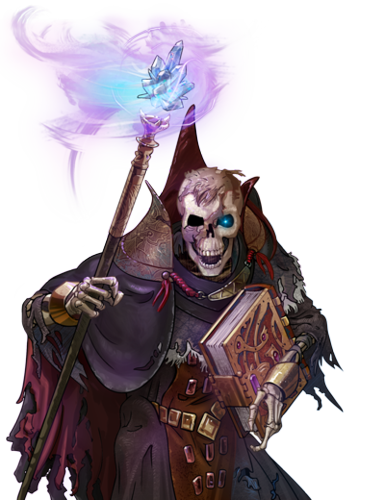Descent into Darkness
This post would not have been possible without the monstrously powerful capabilities of TVTropes, which I would recommend to you, except that I wish for my friends to remain employed.
The Wesnoth campaign Descent Into Darkness is the story of a young adept named Malin Keshar. The unfortunate Keshar turns to necromancy - first to save his village...then to gain revenge for the disgrace of his expulsion from same...then to punish those who destroyed his life and world.

Playing through this story, I found it more compelling and more psychologically believable than Lucas's garbled account of the corruption of young Skywalker. In any case, Skywalker's odd behavior has now been put down to a psychological disorder rather than a series of moral choices. I feel sorry for the generation of kids growing up with this incoherent mythos, trying to parse the logic of a character whose creator, despite massive indoctrination into the work of Joseph Campbell, was unable to understand the basics of the Protagonist Journey to Villain trope.
Descent Into Darkness does better. When the story opens, Malin Keshar is already the protagonist in a Tragedy of Impulsiveness. As a promising child of 10 he was sent to the magic academy on the Isle of Alduin, but was expelled after casting an ill-considered curse on a classmate.
Now back in his hometown of Parthyn he faces a terrible choice. The village is on the northern border of Wesnoth, and must annually fend off orc raids. But the orcs have caught the village with its guard down. Many men are away in hunting parties, and the understrength garrison faces an unusually powerful attack. Well, if you had the choice of being in an orcish stewpot or summoning The Undead, what would you do?

Well, he does what he has to do, and his community does what it has to do - they drive him out, and he becomes a Well-Intentioned Extremist, raising undead against the orcs in hopes of winning back the affections of his people. He is guided in this by Evil Mentor Darken Volk, who, over the course of a few seasons, imparts to him the skills he needs to become a true Necromancer.
Of course they return to Parthyn, and of course his people again reject him. Enraged, he agrees to help Volk recover a heavily-guarded book, only to discover that he was an Unwitting Pawn. Of course Volk knew there was no hope that Malin Keshar's people would accept him, but this gave the young adept the motivation he needed to become powerful enough to help him achieve his goal. Malin Keshar has learned, the hard way, that You Can't Thwart Stage One, and You Can't Go Home Again. The strain is starting to show:

But Darken Volk has forgotten about the Mentor Occupational Hazard. As the two immensely powerful magic users face off, a team of paladins arrives intent on destroying both of them. Not much later another army arrives from Parthyn, led by Malin Keshar's sister, who has sworn to kill him, and the HSQ goes Up to Eleven.
In the brief parley with his sister he explains that I Did What I Had to Do and You Have to Believe Me, but there's a bit of Fridge Logic in her complete refusal to listen to him. This is the toughest scenario in the campaign, and by the time Malin makes off with the MacGuffin, there is not much left of his army, or anyone else's.
Too late, he learns it has all been a Senseless Sacrifice. Parthyn is a Doomed Hometown. And that drives Malin over the Moral Event Horizon, and into the conviction that Disproportionate Retribution - the total extermination of the orcs - is the only thing that can fill the void in his soul. The MacGuffin, it turns out, is a Deadly Upgrade with a Necessary Drawback, and after being mortally wounded and muttering an incantation, the country magic user has become a Lich - one that that each season brings forth hordes of the undead to torment the orcs, before being finally driven back, until, one day far in the future, a hero completes his quest by destroying him.

It is hard to draw a moral from such a dark story, but perhaps we can say that He Who Fights Monsters may end up with a Skull for a Head...?
Anyway, the story is sticking with me. Ultimately his life and death were entirely in vain. Despite his single-minded determination, he failed to protect his home, and then failed to achieve vengeance by eradicating the orcs.
And yet, can we really call him evil? From his expulsion from the academy until the final rejection by his people, his sole motivation was the protection of his hometown. To have expended all of one's physical and spiritual resources to these ends is the mark of a hero, not a monster. The only difference (an important one, Cheney would point out) is the result.
It's a good story. It avoids the worst traps of the genre, and points to a possible state of the universe that deserves some thought. It could be that in this life it is not really possible to know which side you're on. What if you've got to serve somebody, but there's no way of knowing who is who? Or what if there just are no sides? You can take Sartre's answer or Kierkegaard's, I suppose, but one could wish for an improvement on these two options.
Not bad for a computer game. I hope someone buys the rights and makes an Epic Movie of it. I'd buy a ticket.


0 Comments:
Post a Comment
<< Home